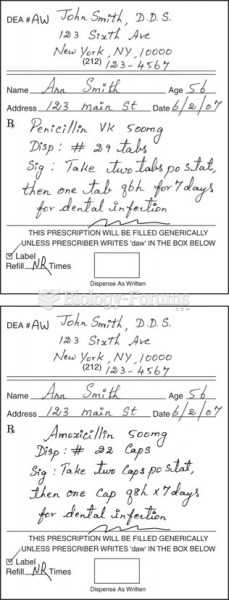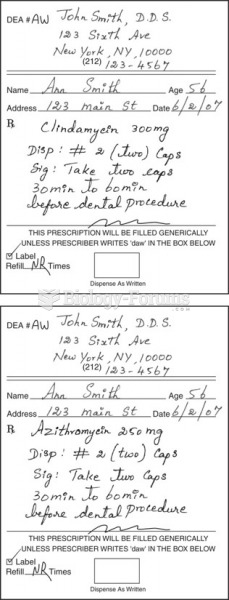Answer to Question 1
Correct Answer: 1,2,3
Rationale 1: A client with a suppressed immune system would be treated with prophylactic antibiotics.
Rationale 2: Deep wounds such as dog bites are treated with prophylactic antibiotics.
Rationale 3: Antitubercular drugs are prescribed prophylactically for any client in close contact with a person diagnosed with TB.
Rationale 4: A client who is being treated for a venereal disease would not be considered high risk and would not be treated with prophylactic antibiotics in addition to the current antibiotic regimen.
Rationale 5: A client who has just delivered a premature baby would not be considered high risk and would not be treated with prophylactic antibiotics.
Global Rationale: Only in rare cases are anti-infectives given prophylactically for indefinite time periods. Examples include the prevention of infections in patients with suppressed immune systems such as those with HIV infection, or those receiving immunosuppressants following an organ transplant, patients with deep puncture wounds, or close exposure to persons with active tuberculosis.
Answer to Question 2
Correct Answer: 1,2,3,4
Rationale 1: MRSA is resistant to fluoroquinolones.
Rationale 2: MRSA is resistant to macrolides.
Rationale 3: MRSA is resistant to aminoglycosides.
Rationale 4: MRSA is resistant to tetracyclines.
Rationale 5: Linezolid (Zyvox) is a newer antibiotic that is effective against MRSA.
Global Rationale: MRSA is a type of bacterium that is resistant to certain antibiotics such as methicillin, amoxicillin, and penicillin. At least 60 of S. aureus infections are now resistant to penicillin. The term methicillin resistant is still used for these infections despite the fact that methicillin was removed from the market many years ago. In recent years, MRSA strains have developed resistance to most classes of antimicrobials, including fluoroquinolones, macrolides, aminoglycosides, tetracyclines, and clindamycin.








